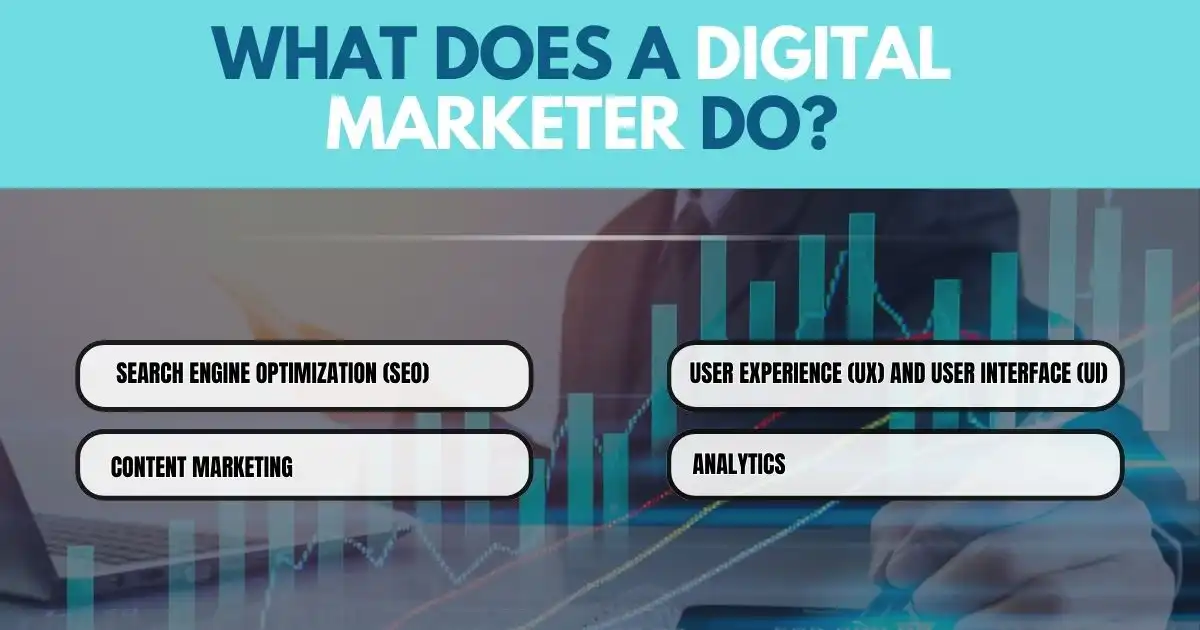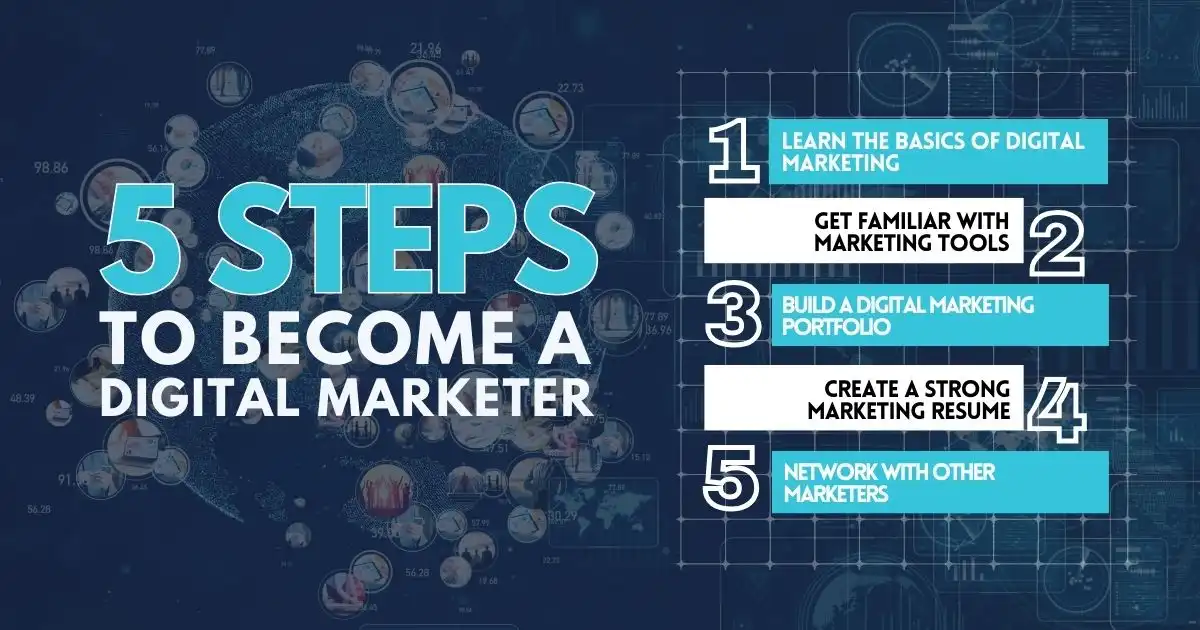There are many paths to becoming a Digital Marketer.
According to the McKinsey Global Institute (MGI), the digital economy could drive productivity and generate 60-65 million new jobs by 2025.
While some start in traditional marketing roles before focusing on digital, this isn’t a strict requirement; no specific background is needed—just the right skills. People often transition into digital marketing from various fields, such as Copywriting, Web Development, or Influencing.
This growing demand opens up numerous opportunities for anyone looking to enter the field.
What Is A Digital Marketer?
A digital marketer promotes a business and its products online using tools like social media, search engines, and ads to attract customers and build brand awareness. They combine creativity and data to improve a company’s online presence, with some managing all digital activities and others focusing on specific areas.
What Does a Digital Marketer Do?

A digital marketer helps companies promote their business online by creating, managing, and analyzing content. Their main tasks focus on a few key areas:
- Search Engine Optimization (SEO) – Digital marketers use SEO to make sure their content shows up in search engine results, helping potential customers find them. This involves researching keywords to improve rankings.
- Content Marketing – They create written and video content to attract customers and drive traffic to the company’s website.
- User Experience (UX) and User Interface (UI) – Digital marketers improve how users interact with a website or app, making it easier and more engaging to use.
- Analytics – They use data to track website traffic and see which content or ads bring in the most sales or leads.
5 Steps to Become a Digital Marketer

Starting a career in digital marketing can be exciting, as it offers numerous opportunities for growth and creativity. Here are five essential steps to help you get started and build a solid foundation in the field.
Step 1. Learn the Basics of Digital Marketing
Start by gaining skills in SEO, social media, analytics, and email marketing. These are the foundations of digital marketing. Also, develop soft skills like creativity, communication, and an awareness of online trends. You can learn these skills through online courses, tutorials, or digital marketing boot camps that provide hands-on experience.
Step 2. Get Familiar with Key Tools
Digital marketing relies on specific tools to track and manage campaigns. Start with Google Analytics and Google Ads to measure campaign success. Use email marketing tools like MailChimp to send newsletters, and design tools like Canva to create engaging visuals.
Social media management tools like Buffer or Hootsuite help you organize multiple accounts, making them essential for social media marketing. Knowing these tools will help you stand out to employers.
Step 3. Build a Digital Marketing Portfolio
A portfolio is your way to showcase your skills and experience to potential employers. Include examples of your work, like social media posts, blog articles, or ad campaigns. If you can, include data showing the impact of your work, such as “Increased engagement by 25%.”
Be sure to highlight the role you played in creating each project, whether it was designing graphics or writing copy. If you’re new, consider including personal or volunteer projects to demonstrate your abilities.
Step 4. Create a Strong Marketing Resume
Your resume should be simple, clear, and focused on your skills and achievements. Organize it well and emphasize your digital marketing skills, especially the ones that match the job you’re applying for.
Use bullet points to make it easy to read, and include numbers to highlight your results (e.g., “Increased website traffic by 20% in three months”). Customize your resume for each job by focusing on the skills the company values and adding a personal touch to reflect the company’s culture.
Step 5. Network with Other Marketers
Networking is important in digital marketing. Build your online presence through platforms like LinkedIn or Twitter, and consider starting a blog to share your insights. Attend digital marketing events, both in-person and virtual, to meet others in the industry.
Joining online communities or forums where marketers share advice and opportunities is another way to connect. Networking can help you find job openings, gain advice, and stay updated on industry trends.
Take the First Step into Digital Marketing
Becoming a digital marketer isn’t just following steps—jumping in and learning as you go. The skills you learn now will help you in the future, but success takes time and effort. Like planting a seed, you have to give it time to grow and put in the work. Don’t let fear stop you—everyone starts somewhere, and mistakes are part of the journey.
The digital marketing world is full of opportunities, but only those who stay committed will succeed. Start today by learning the fundamentals, building your portfolio, and connecting with others.
The digital marketing field is waiting for you—take the first step and make it yours. Ready to set your financial mindset on the right track? Download our free Money Mindset Journal and kickstart your journey to success!
FAQs
Is digital marketing hard?
Digital marketing can be challenging, especially if you’re new to the field. It requires creativity, technical skills, and the ability to adapt to ever-changing trends. However, with consistent learning and practice, it becomes easier and more rewarding over time.
Can I learn digital marketing on my own?
Yes, you can learn digital marketing on your own! There are many online resources, free courses, and tools available that allow you to self-study. While structured courses may be beneficial, a lot of self-learning, combined with hands-on experience, can also lead to success in digital marketing.
How long does it take to become a digital marketer?
The time it takes to become a digital marketer depends on your learning pace and the skills you already have. If you’re starting from scratch, it can take anywhere from a few months to a year to develop the necessary skills and gain experience through courses, boot camps, or hands-on projects.
How to get a job in digital marketing?
To get a job in digital marketing, start by building a strong portfolio that showcases your skills in areas like SEO, content marketing, and analytics. Networking, obtaining relevant certifications, and applying for entry-level positions or internships can help you land your first job in the field.
